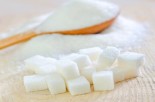Sugar is one of the most popular and most addicting ingredients found in your food.
However, you're probably unaware of just how much sugar you are actually eating on a daily basis.
In fact, Americans consume around 156 pounds of added sugars each year, and only 29 pounds of that sugar comes from traditional sugar cane.
Nutritionists suggests that Americans should only get 10 percent of their calories from sugar, or 13.3 teaspoons of sugar each day (based on 2,000 calories per day).
Are you aware that everything you consume contains sugar, whether it's naturally there or added in? Foods such as granola, cereals, bread, crackers, yogurt, soda and candy all contain added sugar.
Some foods contain natural sugars, such as fruit and veggies. For example, one large sized apple contains around 23g of natural sugar. This may seem like a lot but this sugar is in its natural state and is not being added in apple juice, for example.
How can you be sure that you're eating natural sugar?
The biggest step is making sure that you're reading the nutrition labels on foods before you buy and eat them. Also, eliminating sugary drinks for healthier options will help lower your sugar intake.
Research psychologist and neuroscientist and an expert in the fields of nutrition, diet and addiction, Nicole Avena, PhD, discusses why you're eating more sugar than you think, the difference between added and natural sugar and ways to decrease your sugar intake.
Selected Podcast
Sugar: Are You Eating Too Much By Accident?

Featured Speaker:
 Dr. Nicole Avena is a research psychologist and neuroscientist who is an expert in the fields of nutrition, diet and addiction.
Dr. Nicole Avena is a research psychologist and neuroscientist who is an expert in the fields of nutrition, diet and addiction.
She received a Ph.D. in Psychology and Neuroscience from Princeton University in 2006, followed by a postdoctoral fellowship at Rockefeller University. Dr. Avena presently holds a faculty position at the New York Obesity Research Center, Columbia University.
She has published over 60 scholarly journal articles on topics related to diet, nutrition and overeating. Her research achievements have been honored by awards from groups including the NY Academy of Sciences, the American Psychological Association, and the National Institute on Drug Abuse.
Dr. Avena's latest book, Why Diets Fail (2014, Ten Speed Press) reviews the research on food addiction and provides a way in which people can remove added sugars and carbohydrates from their diet.
Dr. Avena regularly makes public speaking appearances to discuss her research and discoveries throughout the United States, Europe and Asia. She is regularly asked to speak to special-interest groups, industry groups, and schools.
She has appeared on several television news programs (in NY, AZ and FL), The Couch, and recently taped a segment on sugar addiction for The Dr. Oz Show (airing in March 2014). She has also been a guest on several radio programs, and has been filmed for two documentaries on the obesity epidemic.
Dr. Avena's work has also been featured in many popular print forums, including Shape, Women's Health, NY Times, Bloomberg Business Week, and Men's Health.
Dr. Avena has a blog on Psychology Today, and you can also follow her on Twitter or Facebook.
Nicole M. Avena, PhD
 Dr. Nicole Avena is a research psychologist and neuroscientist who is an expert in the fields of nutrition, diet and addiction.
Dr. Nicole Avena is a research psychologist and neuroscientist who is an expert in the fields of nutrition, diet and addiction.She received a Ph.D. in Psychology and Neuroscience from Princeton University in 2006, followed by a postdoctoral fellowship at Rockefeller University. Dr. Avena presently holds a faculty position at the New York Obesity Research Center, Columbia University.
She has published over 60 scholarly journal articles on topics related to diet, nutrition and overeating. Her research achievements have been honored by awards from groups including the NY Academy of Sciences, the American Psychological Association, and the National Institute on Drug Abuse.
Dr. Avena's latest book, Why Diets Fail (2014, Ten Speed Press) reviews the research on food addiction and provides a way in which people can remove added sugars and carbohydrates from their diet.
Dr. Avena regularly makes public speaking appearances to discuss her research and discoveries throughout the United States, Europe and Asia. She is regularly asked to speak to special-interest groups, industry groups, and schools.
She has appeared on several television news programs (in NY, AZ and FL), The Couch, and recently taped a segment on sugar addiction for The Dr. Oz Show (airing in March 2014). She has also been a guest on several radio programs, and has been filmed for two documentaries on the obesity epidemic.
Dr. Avena's work has also been featured in many popular print forums, including Shape, Women's Health, NY Times, Bloomberg Business Week, and Men's Health.
Dr. Avena has a blog on Psychology Today, and you can also follow her on Twitter or Facebook.